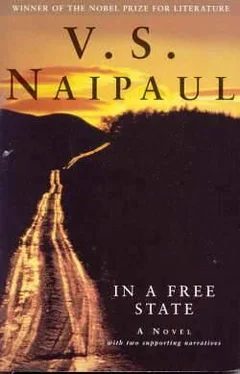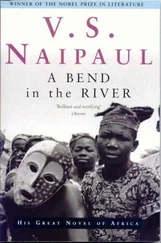Vidiadhar Naipaul - In A Free State
Здесь есть возможность читать онлайн «Vidiadhar Naipaul - In A Free State» весь текст электронной книги совершенно бесплатно (целиком полную версию без сокращений). В некоторых случаях можно слушать аудио, скачать через торрент в формате fb2 и присутствует краткое содержание. Жанр: Современная проза, на английском языке. Описание произведения, (предисловие) а так же отзывы посетителей доступны на портале библиотеки ЛибКат.
- Название:In A Free State
- Автор:
- Жанр:
- Год:неизвестен
- ISBN:нет данных
- Рейтинг книги:5 / 5. Голосов: 1
-
Избранное:Добавить в избранное
- Отзывы:
-
Ваша оценка:
- 100
- 1
- 2
- 3
- 4
- 5
In A Free State: краткое содержание, описание и аннотация
Предлагаем к чтению аннотацию, описание, краткое содержание или предисловие (зависит от того, что написал сам автор книги «In A Free State»). Если вы не нашли необходимую информацию о книге — напишите в комментариях, мы постараемся отыскать её.
«V. S. Naipaul tells stories which show us ourselves and the reality we live in. His use of language is as precise as it is beautiful.» – The London Times
«A Tolstoyan spirit…The so-called Third World has produced no more brilliant literary artist.» – John Updike, The New Yorker
«The coolest literary eye and the most lucid prose we have.» – The New York Review
In A Free State — читать онлайн бесплатно полную книгу (весь текст) целиком
Ниже представлен текст книги, разбитый по страницам. Система сохранения места последней прочитанной страницы, позволяет с удобством читать онлайн бесплатно книгу «In A Free State», без необходимости каждый раз заново искать на чём Вы остановились. Поставьте закладку, и сможете в любой момент перейти на страницу, на которой закончили чтение.
Интервал:
Закладка:

Vidiadhar Surajprasad Naipaul
In A Free State
A Novel with two supporting narratives
Prologue, from a journal: The Tramp at Piraeus
IT WAS ONLY a two-day crossing from Piraeus to Alexandria, but as soon as I saw the dingy little Greek steamer I felt I ought to have made other arrangements. Even from the quay it looked overcrowded, like a refugee ship; and when I went aboard I found there wasn't enough room for everybody.
There was no deck to speak of. The bar, open on two sides to the January wind, was the size of a cupboard. Three made a crowd there, and behind his little counter the little Greek barman, serving bad coffee, was in a bad mood. Many of the chairs in the small smoking-room, and a good deal of the floor space, had been seized by overnight passengers from Italy, among them a party of overgrown American schoolchildren in their mid-teens, white and subdued but watchful. The only other public room was the dining-room, and that was being got ready for the first of the lunch sittings by stewards who were as tired and bad-tempered as the barman. Greek civility was something we had left on shore; it belonged perhaps to idleness, unemployment and pastoral despair.
But we on the upper part of the ship were lucky. We had cabins and bunks. The people on the lower deck didn't. They were deck passengers; night and day they required only sleeping room. Below us now they sat or lay in the sun, sheltering from the wind, humped figures in Mediterranean black among the winches and orange-coloured bulkheads.
They were Egyptian Greeks. They were travelling to Egypt, but Egypt was no longer their home. They had been expelled; they were refugees. The invaders had left Egypt; after many humiliations Egypt was free; and these Greeks, the poor ones, who by simple skills had made themselves only just less poor than Egyptians, were the casualties of that freedom. Dingy Greek ships like ours had taken them out of Egypt. Now, briefly, they were going back, with tourists like ourselves, who were neutral, travelling only for the sights; with Lebanese businessmen; a troupe of Spanish night-club dancers; fat Egyptian students returning from Germany.
The tramp, when he appeared on the quay, looked very English; but that might only have been because we had no English people on board. From a distance he didn't look like a tramp. The hat and the rucksack, the lovat tweed jacket, the grey flannels and the boots might have belonged to a romantic wanderer of an earlier generation; in that rucksack there might have been a book of verse, a journal, the beginnings of a novel.
He was slender, of medium height, and he moved from the knees down, with short springy steps, each foot lifted high off the ground. It was a stylish walk, as stylish as his polka-dotted saffron neck-scarf. But when he came nearer we saw that all his clothes were in ruin, that the knot on his scarf was tight and grimy; that he was a tramp. when he came to the foot of the gangway he took off his hat, and we saw that he was an old man, with a tremulous worn face and wet blue eyes.
He looked up and saw us, his audience. He raced up the gangway, not using the hand-ropes. Vanity! He showed his ticket to the surly Greek; and then, not looking about him, asking no questions, he continued to move briskly, as though he knew his way around the ship. He turned into a passageway that led nowhere. With comical abruptness he swung right round on 'one heel and brought his foot down hard.
'Purser,' he said to the deck-boards, as though he had just remembered something. 'I'll go and see the purser.'
And so he picked his way to his cabin and bunk.
Our sailing was delayed. While their places in the smoking-room were being watched over, some of the American schoolchildren had gone ashore to buy food; we were waiting for them to come back. As soon as they did – no giggles: the girls were plain, pale and abashed – the Greeks became especially furious and rushed. The Greek. language grated like the anchor chain. Water began to separate us from the quay and we could see, not far from where we had been, the great black hulk of the liner _Leonardo da Vinci__, just docked.
The tramp reappeared. He was without his hat and rucksack and looked less nervous. Hands in trouser pockets already stuffed and bulging, legs apart, he stood on the narrow deck like an experienced sea-traveller exposing himself to the first sea breeze of a real cruise. He was also assessing the passengers; he was looking for company. He ignored people who stared at him; when others, responding to his own stare, turned to look at him he swivelled his head away.
In the end he went and stood beside a tall blond young man.
His instinct had guided him well. The man he had chosen was a Yugoslav who, until the day before, had never been out of Yugoslavia. The Yugoslav was willing to listen. He was baffled by the tramp's accent but he smiled encouragingly; and the tramp spoke on.
'I've been to Egypt six or seven times. Gone around the world about a dozen times. Australia, Canada, all those countries. Geologist, or used to be. First went to Canada in 1923. Been there about eight times now. I've been travelling for thirty-eight years. Youth-hostelling, that's how I do it. Not a thing to be despised. New Zealand, have you been there? I went there in 1934. Between you and me, they're a cut above the Australians. But what's nationality these days? I myself, I think of myself as a citizen of the world.'
His speech was like this, full of dates, places and numbers, with sometimes a simple opinion drawn from another life. But it was mechanical, without conviction; even the vanity made no impression; those quivering wet eyes remained distant.
The Yugoslav smiled and made interjections. The tramp neither saw nor heard. He couldn't manage a conversation; he wasn't looking for conversation; he didn't even require an audience. It was as though, over the years, he had developed this way of swiftly explaining himself to himself, reducing his life to names and numbers. When the names and numbers had been recited he had no more to say. Then he just stood beside the Yugoslav. Even before we had lost sight of Piraeus and the _Leonardo da Vinci__ the tramp had exhausted that relationship. He hadn't wanted company; he wanted only the camouflage and protection of company. The tramp knew he was odd.
At lunch I sat with two Lebanese. They were both overnight passengers from Italy and were quick to explain that it was luggage, not money, that had prevented them travelling by air. They looked 'a good deal less unhappy with the ship than they said they were. They spoke in a mixture of French, English and Arabic and were exciting arid impressing each other with talk of the money other people, mainly Lebanese, were making in this or that unlikely thing.
They were both under forty. One was pink, plump and casually dressed, with a canary pullover; his business in Beirut was, literally, money. The other Lebanese was dark, well-built, with moustached Mediterranean good looks, and wore, a three-piece check suit. He made reproduction furniture, in Cairo and he said that business was bad since the Europeans had left. Commerce and culture had vanished from Egypt; there was no great demand among the natives for reproduction furniture; and there was growing prejudice against Lebanese like himself. But I couldn't believe in his gloom. While he was talking to us he was winking at one of the Spanish dancers.
At the other end of the 'room a fat Egyptian student with thick-lensed glasses was being raucous in German and Arabic. The German couple at his table were laughing. Now the Egyptian began to sing an Arabic song.
Читать дальшеИнтервал:
Закладка:
Похожие книги на «In A Free State»
Представляем Вашему вниманию похожие книги на «In A Free State» списком для выбора. Мы отобрали схожую по названию и смыслу литературу в надежде предоставить читателям больше вариантов отыскать новые, интересные, ещё непрочитанные произведения.
Обсуждение, отзывы о книге «In A Free State» и просто собственные мнения читателей. Оставьте ваши комментарии, напишите, что Вы думаете о произведении, его смысле или главных героях. Укажите что конкретно понравилось, а что нет, и почему Вы так считаете.











